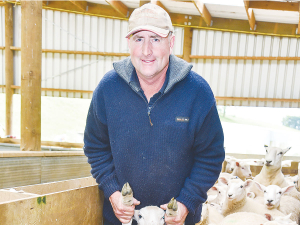Breeder credits late uncle for hair sheep success
Southland breeder Tim Gow attributes the success of his Shire breed of hair sheep to the expert guidance of his uncle, the late Dr Scott Dolling, who was a prominent Australian animal geneticist.
 Waimate farmer Tim Mehrtens says he has been pleasantly surprised at the Wiltshire's mothering ability and pre-weaning growth rates.
Waimate farmer Tim Mehrtens says he has been pleasantly surprised at the Wiltshire's mothering ability and pre-weaning growth rates.
Continuing poor returns for crossbred wool coupled with the emergence of triple drench resistance is driving an increasing number of sheep farmers to consider making the shift to low-input, no-shear Wiltshires.
Aside from shearing, the costs of crutching, dagging and flystrike are all eliminated with these shedding sheep. Meanwhile, Wiltshires are said to be more resistant and resilient to internal parasites than their wooly counterparts.
Will Pears, stud manager at North Canterbury's Mt Cass Wiltshire stud, says last year's inaugural sale exceeded all expectations in terms of price and interest. He is expecting the same at this year's sale on January 19.
Pears says last year more than 100 buyers from around the country competed strongly for both rams and ewes and feedback from purchasers has been overwhelmingly positive.
One of those buyers was Waimate farmer Tim Mehrtens. He admits it took a leap of faith in buying Wiltshire ewe lambs and rams at the Mt Cass's sale but was rewarded with a good lambing percentage and very good pre-weaning growth rates.
Mehrtens, who farms 215ha of rolling hill country, says the shift to Wiltshire genetics was driven by frustration with poor returns for wool. While he has been buying very good composite ewe lambs, in 2020 the difference between shearing costs and the wool cheque left him $3,500 out of pocket.
The first crop of pure Wiltshire and Wiltshire cross lambs, born last spring, exceeded expectations. Mehrtens says he was pleasantly surprised at the pre-weaning growth rates and their mothering ability.
Forced to wean early due to limited processing space, he says 220 twin male lambs killed out at 17.5 kgCW and a line of Wiltshire cross lambs averaged 17.7 kgCW.
Mehrtens has also noticed that a lot of the first cross lambs have started to shed.
"I'm stoked with the results," he says.
Budou are being picked now in Bridge Pā, the most intense and exciting time of the year for the Greencollar team – and the harvest of the finest eating grapes is weeks earlier than expected.
The Real Estate Institute of New Zealand (REINZ) has released its latest rural property report, providing a detailed view of New Zealand’s rural real estate market for the 12 months ending December 2025.
Rural retailer Farmlands has released it's latest round of half-year results, labeling it as evidence that its five-year strategy is delivering on financial performance and better value for members.
OPINION: "We are back to where we were a year ago," according to a leading banking analyst in the UK, referring to US president Donald Trump's latest imposition of a global 10% tariff on all exports into the US.
DairyNZ says the Government’s proposed Resource Management Act reform needs further work to ensure it delivers on its intent.
Overseas Trade Minister Todd McClay says he's working constructively with the Labour Party in the hope they will endorse the free trade agreement (FTA) with India when the agreement comes before Parliament for ratification.

OPINION: A mate of yours truly reckons rural Manawatu families are the latest to suffer under what he calls the…
OPINION: If old Winston Peters thinks building trade relations with new nations, such as India, isn't a necessary investment in…